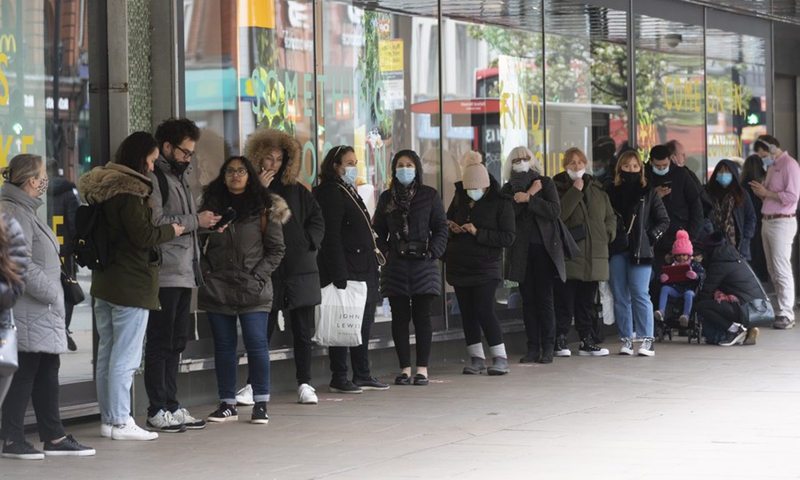UK govt accused of ‘chumocracy’
Questions over pandemic-related contracts amid court cases

Photo taken on April 12, 2021 shows customers queuing up to enter a department store in London, Britain.(Photo:Xinhua)
Britain's government is facing growing criticism over how it awarded contracts for virus-related goods and services during the pandemic, its detractors alleging a "chumocracy" in which politically connected companies got priority."I think in comparison to Britain 10 years ago, there's a level of corruption that we haven't reached before," said Emily Barritt, a lecturer in law at King's College London.
The latest revelation came in late June when Health Secretary Matt Hancock resigned after it emerged he was having an affair with a university friend he had appointed as an aide.
Hancock was already facing questions over a series of virus-related contracts. One was a 30 million pound ($41 million) contract to produce vials for COVID-19 testing that was awarded without competition to a company run by his former neighbor, who had no background in making medical goods. The conservative Daily Telegraph has reported that another 28 million pond contract was awarded to a healthcare company where Colodangelo's brother is strategy director.
And in June, the High Court ruled against another senior Conservative minister, Michael Gove. Gove had unlawfully awarded a 560,000 pond contract for virus-related communications to market research firm Public First, having failed to go through proper procedures. The company's founders are friends of Dominic Cummings, who until recently served as Prime Minister Boris Johnson's top adviser.
The opposition Labour party is calling for an independent probe into the government's handling of the pandemic.
Its Shadow Secretary of State for Scotland Ian Murray told the BBC: "The huge part of the story is all the issues that remain unresolved with regards to cronyism." Rules on awarding public contracts were already very flexible, said Daniel Fisher, a postgraduate researcher at City University of London.
The pandemic "has provided opportunities to relax rules even further," with a loosening in ethical standards leading to "speedy opaque contracting."
The Department of Health and Social Care, contacted for comment by AFP, said that it was "inaccurate to say we have relaxed the procurement rules."
The ministry has "stringent rules in place" and "ministers have no role in this process," it insisted. The government does have the right in the case of a major emergency to award contracts without competitive tendering. But it is legally obliged to publish the terms of the contracts awarded - something it did not do in a number of cases.

